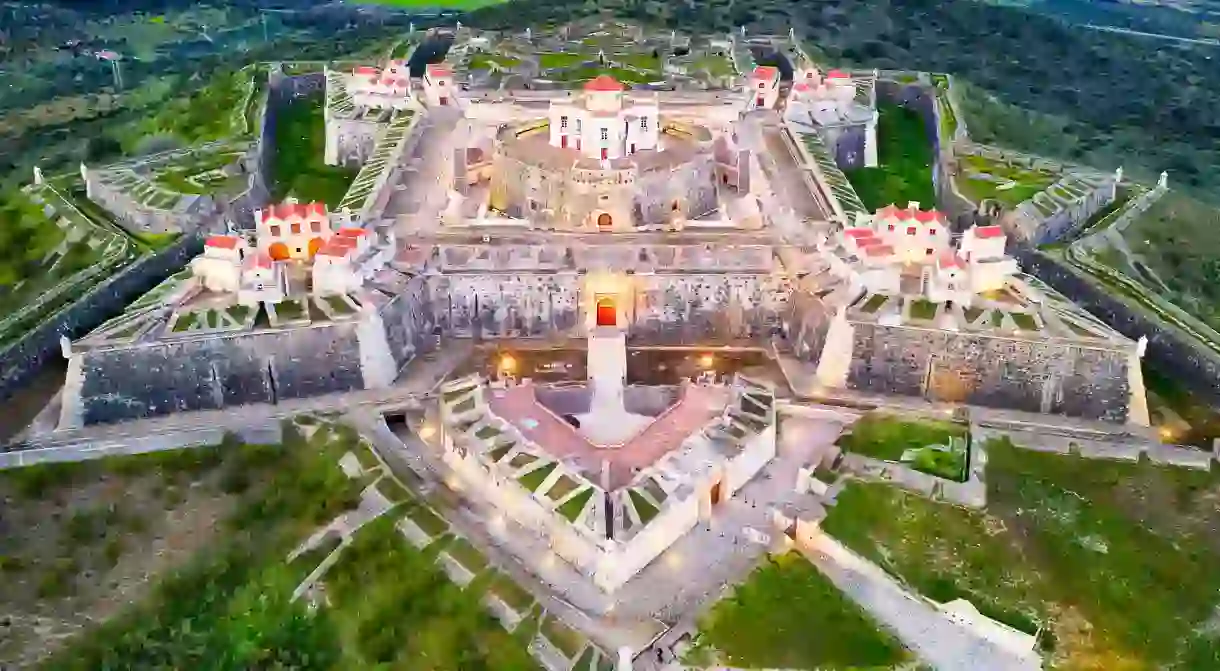A Solo Traveller’s Guide to Portugal

Slower to the mass-tourism table than neighbouring Spain, Portugal still has some surprises up its Iberian sleeve. Even if you’re familiar with the centuries-old charm of Lisbon and the sun-bleached beaches on the Algarve, there’s a different side of Portugal – from a scattering of remote Mediterranean villages with a slower pace of life, to the city of Porto, in the cooler, greener north. Everywhere you’ll see the glazed ceramic tiles depicting different moments of history and pastéis de nata, irresistible sunshine-yellow tarts.
A Portugal trip overview

The longer the trip the better, of course – but in a matter of days you can get a sense of what attracts around 28 million visitors each year. Twinning Lisbon and Porto creates the perfect weekend break; stay a week and you can add in a coast or vineyard jaunt.
Lisbon is a balancing act of traditional and hip, wooing you with history, seafood, emerging districts and a mild coastal climate. Half an hour away is the indulgent fantasy of Sintra, a must-see Unesco World Heritage hilltop town of ornate palaces and gorgeous gardens. Further north, the culinary charms of Porto are abundant, from the petiscarias (Portuguese-style tapas bars) to the port cellars the city is famed for. Meanwhile, further south, the Alentejo spans the bottom third of the country. It’s a sparsely populated region of whitewashed villages, olive and cork-tree groves.
Among Portugal’s key charms is its year-round sunshine. The summer months from May to August are searing, so if you find strong heat too much, aim to travel in late spring and early autumn.
Where to stay in Portugal

Sidestep sleek modern hotels for a taste of Portugal’s rich heritage: a stay in one of the country’s characterful converted pousadas, or heritage accommodations. From monasteries to medieval castles in urban and rural locations, all share a sense of culture and luxury, celebrating Portugal’s diverse regional cuisine. Need more inspiration? Explore Culture Trip’s favourite places to stay in Portugal here.
What to do in Portugal
You could visit every year for a lifetime and still have more to see. On the plus side, as it’s such a sliver of a country, you can see a lot in a short time.
Scale Portugal’s highest mountain range

The Serra da Estrela, which divides the north from the south, is a crowd-free region of supreme beauty, with horizons of wild flowers and plenty of wildlife sightings; in winter, this is the only place in Portugal where you can strap your skis on.
Fill your face in a pastelaria

Pastelarias, like the creamy-crumbly pastéis de nata they peddle, are a Lisbon institution – one of the most revered is Manteigaria (Fábrica de Pastéis de Nata), always busy with Lisboetas stocking up on the nation’s beloved custard tarts. Buy six in a clever travel tube and you can fly home with them. Actually, buy more – they’re irresistibly moreish.
Seek out wine and port

Without a doubt, the Douro is one of the world’s most beautiful regions – a Unesco World Heritage site since 2001. The terraced vineyards where the port grapes are grown are best admired from the river. A boat trip aboard a rabelo, one of the traditional vessels used to transport port to Porto, is the cherry on the cake of a trip here.
You can float along the scenic Douro River as part of Culture Trip’s nine-day exploration of northern Portugal, led by our Local Insider.
Eating and drinking in Portugal

Most of the nation’s best-known dishes nod to the coast and the sea – hence the abundance of fish-rich seafood stews (cataplana) and fresh grilled sardines. Affordable and flavoursome, bacalhau (salted codfish) is dear to the hearts of the Portuguese; they even eat it on Christmas Eve. Try crispy pastéis de bacalhau, the perfect small plate.
It’s fitting that pastéis de nata were invented in a monastery as they are something of a religion, and eaten here for breakfast with a good coffee.
Port comes from the vineyards of the Douro Valley, where you can taste the ruby-coloured fortified wine to your heart’s content. Locals drink it at special occasions.
Whet your appetite with Culture Trip’s Portuguese culinary guides, among them the best Lisbon restaurants, traditional Algarve haunts and Porto’s best bars and cafes.
Stay safe, stay happy
Portugal is a remarkably crime-free country that feels safe for men and women, including LGBTQ travellers. If you’re female, you should feel comfortable most of the time. Just be sensible and take care in – or avoid – remote areas as well as less-touristy urban districts at night.
Getting around

Trams are crucial to getting around Lisbon and Porto; both have an easy-to-use Metro. You could fly between Faro, Lisbon and Porto, but it’s not very green and you’d miss out on the views. Apart from in remote regions, roads are easy to drive on; tolls apply on the motorway. Traveling by bus or by train is easy and affordable. The Eurail Portugal Pass allows unlimited rail journeys on select days within a month – standard or first class. National buses dart across the country and local buses go pretty much everywhere you want.
Cultural need-to-knows
English is widely spoken, making travelling solo easier, but a few Portuguese phrases will be appreciated. People know how to party – the revelry starts late and embraces all ages. But don’t get blotto – Portugal may be home to some of the world’s biggest wine drinkers, but you won’t see them sloshed.
Get to know Portugal with a small group of like-minded travellers on Culture Trip’s nine-day tour of Northern Portugal as you experience the sights and tastes of this fascinating country.













